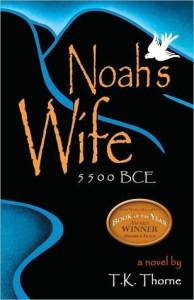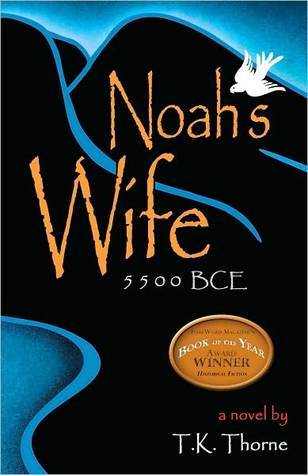“Noah’s Wife” by T. K. Thorne
From the back:
Noah’s wife is Na’amah, a beautiful, brilliant girl with a form of autism (now) known as Asperger’s. She wishes only to be a shepherdess on her beloved hills in ancient Turkey—a desire shattered by her powerful brother’s hatred, the love of two men, and a looming disaster only she knows is coming.
 I got this book in the Historical Novel Society Conference goodie-bag and was intrigued. Asperger Syndrome runs in my family, so I was curious as to how T. K. Thorne would handle that aspect of her debut novel. She states in her “Acknowledgements” and “Postscript” that she doesn’t have AS and relied on research and particularly the writings of Dr. Temple Grandin, a well-known speaker and writer on the topic. (Dr. Grandin is autistic.) For the most part, I felt Thorne got it right. As she notes, this is a neurological condition that runs a vast spectrum of behaviors and can present as a severe disability up to creative genius. Every person with AS presents differently, but they all share a common difficulty with social engagement. They are “clueless” until they figure out, or someone teaches them, the social rules that most children seem to absorb with no instruction. There’s no reason to believe AS didn’t exist in 5500 BCE, but, from a Darwinian point of view, it was probably very rare. Loners, folks who didn’t “belong” or conform to group norms, would have had a significant survival disadvantage. This is how Na’amah describes herself:
I got this book in the Historical Novel Society Conference goodie-bag and was intrigued. Asperger Syndrome runs in my family, so I was curious as to how T. K. Thorne would handle that aspect of her debut novel. She states in her “Acknowledgements” and “Postscript” that she doesn’t have AS and relied on research and particularly the writings of Dr. Temple Grandin, a well-known speaker and writer on the topic. (Dr. Grandin is autistic.) For the most part, I felt Thorne got it right. As she notes, this is a neurological condition that runs a vast spectrum of behaviors and can present as a severe disability up to creative genius. Every person with AS presents differently, but they all share a common difficulty with social engagement. They are “clueless” until they figure out, or someone teaches them, the social rules that most children seem to absorb with no instruction. There’s no reason to believe AS didn’t exist in 5500 BCE, but, from a Darwinian point of view, it was probably very rare. Loners, folks who didn’t “belong” or conform to group norms, would have had a significant survival disadvantage. This is how Na’amah describes herself:
“My name, Na’amah, means pleasant or beautiful. I am not always pleasant, but I am beautiful. Perhaps that is why I am trundled atop this beast like a roll of hides for market and surrounded by grim-faced men. If my captors had bothered to ask me, I would have told them that their prize is of questionable value because my mind is damaged…Memories appear as images in my mind. Each word-sound I hear has its own color and shape and they fit together with the others in patterns that I can recall as easily as I can name every sheep on my hillside…I speak only truth, unwise as it may be, since lies distress me…my words and manner seem odd to other people. I am more comfortable with animals, who do not expect me to be any way than the way I am.”
My Review:
Na’amah is an appealing first person character and, in one sense, an unreliable narrator. Because of her autism, she misses the nuances in others’ behavior, facial expressions and voice. The author has to give the reader clues through Na’amah’s descriptions about what is “really” going on—a tricky proposition and usually handled well. Where it falls down is with Tubal, Na’amah’s brother and nemesis. He is an irredeemably evil character (and therefore boring) from the first pages. Na’amah knows him as a bully with a burning hatred for her. As the story continues, he breaks every (to be written) commandment in the Good Book. The readers have no clue as to why that might be, except that his mother died at Na’amah’s birth. Because we can’t see the nuances, we find out his motivation far too late in the book. Any chance that he might be a complicated (and, therefore, more interesting) character is lost in Na’amah’s black and white world.
Thorne builds a believable prehistoric society. Technology and agriculture are appropriate for the age. But I found the (Earth) Mother Goddess/(Sky) Father God dichotomy a bit religiously simplistic. Most of the evidence we have points to our ancestors’ profound belief in the supernatural, with spirits and “gods” inhabiting every niche of the unknown. Even today, the vast majority of people believe in a range of supernatural beings, so I would have liked to see our ancestors engage in a wider range of belief and practice. The concept of being able to harm others through supernatural means surely did exist and any “odd” person would be at risk for expulsion or other harm, even death. Na’amah’s religious skepticism and her awareness of its dangers, is nicely portrayed:
“I loved stories, though many of them were not truth. People pretended they were, so sometimes I did too, but I had never seen Mother Goddess or Father God…Speaking such thoughts would get me thrown into the pit. My mind might be damaged, but I was not stupid.”
As to the flood? This is not your traditional Bible story. No Heavenly Being giving directions to build an Ark. No animals trooping two by two (sorry dragons and unicorns who didn’t make it on the boat!) But I like this story better. Thorne uses archaeological and geological evidence to put her fictional characters in a real catastrophic situation that might very well have happened. The echoes of that catastrophe have come down to us as fable and myth. Thorne’s version is quite satisfying.
In summary, I enjoyed this book and thought it was a good debut novel. The story is engaging and moves along. The setting is unique and interesting. The science and history seem to be solid. My only complaint is that some characters were a little two-dimensional; but that could be an artifact of the Aspie POV and, therefore, brilliant writing.
The details:
- Title: Noah’s Wife
- Author: T. K. Thorne
- Publisher: Chalet Publishers, LLC; 2009
- ISBN-13: 978-0-9840836-4-0
- Format: Trade paperback, 354 pages,
- Price: $16.95
For more information on Asperger Syndrome:
- National Institutes of Health (AS information page)
- Autism Society (AS webpage)
- OASIS @ MAAP (Online Asperger Syndrome Information and Support center)
- Autism Research Institute
Please note: I received this book free from the publisher, but not in inconsideration for a review. The opinions expressed are my own.

This sounds like an engaging book. I’m interested in your point about portraying complex characters through a POV that by nature misses a lot about human nature. That’s certainly a challenge to set for yourself as a debut writer! It’s a reflection of how wide spread autism (or our awareness of it) has become that a novelist today is seeing the prehistoric world through an autistic lens. Fascinating–thanks for a thought provoking review.
I really enjoyed this review. The concept of a prehistoric character with Asperger’s Syndrome sounds fascinating. As Aspies are on the highest level of the autism spectrum and are often highly intelligent, I’d imagine it entirely possible that they could survive within such a society albeit under pressure of being bullied, misunderstood and ridiculed. And a new take on an age old story has to be worth reading.
Glad you liked the review, Elisabeth! Female Aspies also present differently from boys (their obsessions tend to be more socially acceptable–frequently animals) and probably had a greater chance of surviving. I’ve often wondered how many saints and witches were actually people with some neurological disorder–epilepsy, schizophrenia, etc.
I agree. Joan of Arc is a good example of someone ‘hearing voices’ and may well have been schizophrenic. The sad thing, of course, is that so many women were condemned as witches due only to their knowledge of folk medicines. Geraldine Brooks’ A Year Of Wonders was a great novel on that very subject. Look forward to reading more of your reviews and I love your updates on recent archaeological finds.
Hello all. Stumbled upon this review. Faith, I’m glad you enjoyed Noah’s Wife and thank you for the excellent review and insight. I have to admit that I didn’t “plan” to write this story from the POV of an Aspie. I believe subconsciously, I did want to have a character who coud step back and see the world with different eyes, but the truth is that Na’amah decided who she was early on, and I just followed her lead. She often surprised me, one of the delights of writing.
Just returned from a trip to Israel where I completed research for my next book, Angels at the Gate: the story of Lot’s Wife. It was a fascinating journey!
My Best,
T.K. (Teresa)
http://www.tkthorne.com